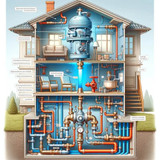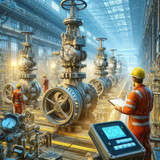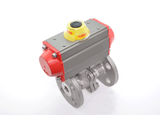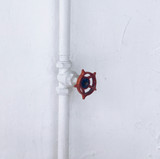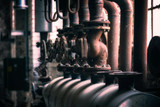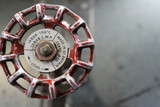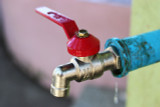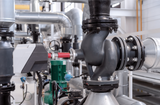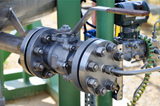At Valveman, we offer a comprehensive selection of high-quality stainless steel fittings to meet the demands of your most critical piping projects. Whether you're navigating the complexities of industrial pipelines or assembling a sanitary system for food and beverage processing, our stainless steel fittings deliver the perfect blend of strength, durability, and corrosion resistance.
Upgrade your piping systems with the confidence and performance that stainless steel fittings provide. Browse our selection today and discover the perfect fit for your project!
Stainless Steel Fittings - Key Features
Stainless steel fittings are integral components in a wide range of industries. Their many advantages make them the first choice for fluid conveyance and structural applications, particularly in corrosive environments.
Corrosion Resistance
The inherent corrosion resistance of stainless steel fittings is the biggest advantage of all and is very much appreciated - especially in places exposed to moisture, certain chemicals, or elevated temperatures. Due to their superior corrosion resistance when compared to other fittings such as brass, bronze, or mild steel, stainless steel fittings possess an extended lifetime with minimal maintenance activities. This corrosion resistance reduces long-term or life-cycle costs, as the replacement and maintenance expenses for stainless steel installations are significantly reduced.
Structural Integrity
Stainless steel connectors are strong, durable and provide fittings that can endure high pressure and mechanical stress without significant deformation or failure. This structural integrity ensures system reliability and safety, which are major considerations in industries where any downtime and disruption to operations carry huge financial and logistic implications.
Hygienic and Easy to Clean
Stainless steel's hygienic characteristics make it an excellent material for industries that need a very high level of cleanliness, such as the food and beverage, pharmaceutical, and healthcare industries. Its non-porousness prevents bacterial growth, facilitates effective cleaning and sterilization procedures, guarantees product purity, and fulfills regulations' standards and requirements. In the United States, the National Sanitation Foundation (NSF) and the Food and Drug Administration (FDA) are two regulatory bodies within the food and beverage and pharmaceutical industries.
Compatibility
Stainless steel fittings are reliable and compatible with a wide range of fluids, operating temperatures, and pressures. Different grades of stainless steel are available to deal with harsh and demanding applications. Whether you are moving water, chemicals, gases, or steam, stainless steel connectors deliver reliable performance and enhance the safety of both the process and operators.
Stainless Steel Fittings - Uses and Applications
Where can you find stainless steel fittings being used?
- Residential and Commercial Plumbing: Stainless steel fittings ensure long-lasting reliability in household water lines, sprinkler systems, and hydronic heating.
- Industrial and Chemical Processing: Their resistance to corrosion from water and a range of chemicals makes them ideal for chemical plants, refineries, and power generation facilities.
- Food and Beverage Production: Sanitary and easy to clean, stainless steel fittings are essential for maintaining hygiene in food and beverage processing plants.
- Water Treatment and Purification: Durable and resistant to rust, stainless steel fittings safeguard the integrity of clean water systems. Note that stainless steel is susceptible to corrosion from chlorine.
- Oil and Gas Applications: Stainless steels are available in a range of alloys, which may be selected to suit the demands of oil and gas pipelines.
- Marine Environments: Stainless steel fittings, particularly Grade 316 stainless steel, provide reliable connections in shipbuilding, marine and offshore applications.
Choosing the Right Stainless Steel Fittings for Your Needs
The selection of the best stainless steel fittings for your needs is key in achieving the best performance, longevity, and cost-effectiveness of your industrial or plumbing system. At ValveMan, our expertise and passion for valves and fittings guides all our decisions, because excellence and customer satisfaction are at the forefront of our operations.
Since the 1960s, ValveMan has led the industry in innovation and growth. Our success is based on the work of our outstanding team, whose unshakable commitment and knowledge are the driving force behind our constant progress.
Selecting stainless steel fittings involves considering factors like application specifications, working environment, and conformity with the larger pipe system. ValveMan supplies a full range of stainless steel fittings, all crafted to match the utmost standards of quality and performance.
Our team of dedicated professionals is ready to help you choose the right fittings for your individual needs. Thanks to their vast expertise and wisdom, they can offer useful comments and suggestions to help you make the best choice for your project.
Moreover, ValveMan pledges to provide our clients with on-time delivery, competitive pricing, and ongoing assistance during the lifetime of our valves. We are confident about our products' quality and committed to going the extra mile to ensure your satisfaction every step of the way.
Whether you need stainless-steel pipe adaptors, sockets, reducers, valves, connectors, or any other component, ValveMan is your dependable partner for all your valve and fitting requirements. Contact us today to discuss our products and services and find out why ValveMan is the preferred choice of organizations and professionals worldwide.
Resources
Our Posts
View AllCan Ball Valves Be Used For Flow Control?
Ball valves are widely used in plumbing and piping systems, in fact, they are one of the most common …
Read MoreIntroducing Bonomi Valves
The Bonomi Group is a leader in industrial sectors including oil and gas, hydraulics, heating and en …
Read MoreUnderstanding Valve Actuators: Manual, Electric, Pneumatic and Hydraulic
Are you a beginner new to the valve world, ready to learn more about the various types of valve actu …
Read More3 Check Valve Mistakes to Avoid
So, you’re looking for a check valve, but you’re not sure if there’s any pitfalls …
Read MoreTypes of Valves in Plumbing
Have you ever wondered what goes into managing the flow of water in your home, or through a building …
Read MoreIntroducing Apollo Valves
Apollo Valves® inventory includes a wide range of valve products supplied to diverse markets. Th …
Read MoreUnderstanding Valve Sizes and Measurement
Sizing the appropriate valve is critical to ensuring the performance of your system. Whether you'r …
Read MoreTypes of Water Valves
Hey there, fellow valve enthusiasts! We all know that valves play a crucial role in regulating th …
Read MoreWhat is a Backflow Preventer, and How Does it Work?
When a simple check valve is inadequate for the job, you need a backflow preventer. But knowing …
Read MoreValve inspection - main points of valve testing in Manufacture setting
Industrial facilities rely on different types of valves (such as check valves, for example) to con …
Read MoreTypes of Ball Valves
Ball valves are important components in a vast range of systems, from small family-owned workshops …
Read MoreUnderstanding valve standards and specifications
Hey there, fellow valve enthusiasts! Today, we're looking at valve codes, standards and specifica …
Read MoreHow to Tell if a Valve is On or Off
We have all been there before. You are staring at a valve; you know that you should know if it …
Read MoreUnderstanding Different Types of Valve Connections and Fittings
Hey there, fellow valve enthusiasts! We know valves play a crucial role in regulating the flow of li …
Read MoreTypes of Valve Handles: Lever and Handwheels
Whether you're involved in industrial work, plumbing, or you're a DIY enthusiast, you come ac …
Read MoreThe Basic Parts of a Valve
Valves quietly work in many different areas, even places you wouldn't expect. They're truly every …
Read MoreGas Ball Valves In Industrial Applications - 5 Things to Keep in Mind
Unlike the standard ball valves, most gas ball valves are tested and approved by CSA. These valves a …
Read MoreHow To Correctly Use A 3 Way Valve In Different Applications
To understand the "T"-port and an "L"-port 3-way valves and what makes them different, it's importan …
Read MoreIndustrial Ball Valves - 9 Questions To Make The Right Choice
Ball valves are versatile flow control devices suitable for extensive industrial applications. They …
Read MoreEverything you need to know about valve types
Valves play crucial roles in production lines and equipment performance across a multitude of ind …
Read More







